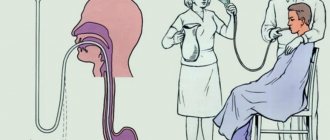One of the symptoms of poisoning is abdominal pain of varying localization and intensity. Some time after the main symptoms disappear, the pain still persists.
loading…
The causes of the pathological condition are different. They can be associated both with intoxication itself and with complications resulting from the disease.
Types, causative factors and clinic of poisoning
Intoxication (poisoning) occurs due to consumption of spoiled foods. Food can be contaminated with bacteria and aggressive toxins of various natures and origins.
All nutritional poisonings are divided into categories:
- microbial;
- provoked by poisons of animals or plants;
- caused by chemicals.
In the case of nutritional poisoning, it is fundamental to determine the therapeutic strategy to determine the causative factor. This also helps to avoid the occurrence of a pathological condition in the future. The development of the disease is facilitated by improper sanitary and hygienic living conditions, irrational storage of food products, consumption of contaminated, over-stitched food or products that have not undergone sufficient heat treatment, which is why microbes remain in it.
Characteristic signs of poisoning include repeated, severe vomiting, nausea, and diarrhea (watery, foul-smelling stools). You can observe increased gas formation in the intestines, rumbling and “transfusion” in the abdomen, severe pain in its different parts. There are also common manifestations, such as:
- headache;
- malaise;
- severe weakness;
- The body temperature rises, the person shudders.
Symptoms appear quickly, usually several hours after eating food contaminated with bacteria or poisons, less often within 24 hours. The stomach begins to hurt first, then, as toxins move through the digestive tract, the intestines also become troubled.
Even timely and adequate therapy does not immediately eliminate the signs of the disease. The process of complete restoration of the gastrointestinal tract takes time. Some symptoms (albeit in a less pronounced form) persist after poisoning for several days - up to a week. We are talking about such manifestations as epigastric pain, general weakness, flatulence, etc.
Symptoms and causes of infection
The most common symptoms observed after food contamination are the following:
- abdominal cramps (during intoxication, the stomach hurts greatly);
- nausea and vomiting;
- diarrhea (during intoxication this is a very characteristic sign).
However, in case of poisoning, symptoms can often worsen significantly and make the treatment process difficult.
Other signs include:
- Blood in the stool or vomiting.
- Dehydration (dehydration of the body after intoxication).
- High fever.
- Diarrhea that lasts more than 3 days.
- Headache.
- Blurred vision.
- Tingling or burning in the extremities.
- Swelling (a common symptom that occurs after infection).
- Liver problems.
- Kidney problems.
- Reactive arthritis.
- Increased fatigue and weakness.
- Seizures.
- Death (in especially severe cases).
While vomiting, diarrhea and dehydration are typical and more severe indicators of various illnesses during foodborne illness, severe pain affecting the stomach, as well as bloating, are potential symptoms that can cause significant discomfort in the affected person and a variety of associated conditions. .
Pain after intoxication, radiating to the stomach, as well as increased gas formation and distension of the stomach, as a rule, can be triggered by eating large portions of food, swallowing air, or additional gas produced by intestinal bacteria and incompletely digested food.
Symptoms of food poisoning (after which the stomach hurts) sometimes depend on which organ is most affected by exposure to toxins and other harmful substances after intoxication.
For example, the nervous system can be affected by neurotoxins such as pesticides and botulism toxin.
When a group of people observe the above symptoms after eating a certain food or products, there is a possibility of food poisoning.
The most well-known pathogens that cause food poisoning are:
- Norovirus.
- Salmonella.
- Clostridium perfringens.
- Campylobacter.
- Staphylococcus aureus.
The most common pathogens that lead to forced hospitalization due to contamination of food and drinking water, and poisoning, are:
- Salmonella.
- Campylobacter.
- Toxoplasma.
- Escherichia coli of the genus E.coli.
Bacterial agents make up the largest category of food poisoning, however, as can be seen from the top categories above, viral infections have the greatest impact on infected patients.
However, they are much less likely to cause hospitalization and death if poisoned than Salmonella bacteria.
Since the majority of "undetermined" causes are likely to be similar in characteristics to diagnosable causes, these viral and bacterial groups are considered the main causes of food poisoning that causes stomach pain.
There are also a lot of different toxins that cause poisoning and, as a result, pain affecting the stomach (after poisoning it hurts quite intensely).
Certain types are formed by bacterial agents in food, others are produced by certain types of plants and animals (or microorganisms that enter the digestive tract).
Although there are many bacterial, plant and other toxins that can be ingested through food and drink and cause poisoning, they are generally limited to relatively small outbreaks in certain regions of the world.
Specific types of chemicals are also toxins that can cause poisoning and affect the stomach.
Although it is known that there is a huge variety of chemicals used in the world, only a few of them have been thoroughly studied.
Despite the fact that most of them are not added to food, certain substances still provoke the appearance of such a condition as poisoning.
A typical example of this type of chemical is mercury, which is found in drinking water and fish (tuna and blue marlin).
Another good example of substances that can become toxic when increased levels contaminate food and water are pesticides and lead.
The nature of pain in the stomach after poisoning
If a person has recently suffered nutritional poisoning, the likelihood that he will have stomach pain for some time is quite high. Pain in this case can be either a residual phenomenon of poisoning or a sign of serious complications.
The nature of the pain that occurs varies. Usually, after mild poisoning, pressing, aching pain appears in the stomach area. They can bother a person continuously or in the form of attacks. Cutting pain is characteristic of poisoning with very aggressive substances (for example, surrogate alcohol). After poisoning, your stomach hurts for at least 1 to 3 days. The period depends on:
- personal characteristics of the body;
- volume of complications;
- nature of poisoning.
The mechanism of pain is associated with the fact that the stomach and intestines are trying to neutralize toxins. In this case, pain occurs around the navel, in the middle of the abdomen or to the left of the navel. Intestinal damage is manifested by pain in the lower abdomen.
Discomfort and pain in the epigastric region may appear due to exacerbation of chronic diseases that were in remission. If the patient has not previously suffered from gastrointestinal diseases, their appearance after toxic infection indicates that they were already at an early stage of occurrence, and poisoning served as an impetus for their rapid progression. For example, almost asymptomatic, latent gastritis or a small ulcer may well become aggravated and worsened due to poisoning. If nutritional poisoning is caused by pathogenic bacterial flora, infectious gastroenteritis (damage to the stomach and intestines by microbes) may develop.
Poisoning in children
Poisoning in a child can be caused by harmless products that do not harm an adult. Intoxication is possible after consumption:
- Dairy products;
- Fish;
- Confectionery with cream;
- Ice cream;
- Raw eggs.
Poisoning in children is caused by dirty hands and toys that they put into their mouths. Within a couple of hours, symptoms appear:
- Vomit;
- Diarrhea;
- Lethargy;
- Temperature increase;
- Dehydration.
The younger the child, the faster the symptoms begin to bother you. Children experience pain in the abdomen, the skin turns pale and dry lips appear. Children's intoxication is treated only under the supervision of a doctor in a hospital setting. The use of medications at home is prohibited. The baby will be helped by dry heat (applying a heating pad to the stomach), which will ease the pain and activate the gastrointestinal tract.
If there are symptoms of food poisoning in a child over 5 years old, it is recommended to perform a gastric lavage and give an enema (with chamomile infusion) to clean the rectum.
Primary care for poisoning
At the first signs of mild poisoning, the victim should be given immediate assistance. First of all, it is necessary to remove from the body harmful substances that have entered it with food. For this purpose, they cleanse the stomach, for which you need:
- Prepare a solution - dilute a little baking soda or table salt in water.
- Drink as much of this liquid as possible.
- Induce vomiting by pressing on the root of the tongue with your fingers. The liquid you drink and the remains of the poisonous food must leave the stomach.
Next, after emptying the stomach, it is recommended to take a sorbent (one of the safest, most common and accessible is activated carbon). To make the product work faster and make it easier to use, charcoal pills can be crushed and dissolved in a glass of clean water. Dose of activated carbon – 1 tablet. per 10 kg of the victim’s weight. After these actions, the patient’s condition should improve. He is advised to drink a lot of fluids (for example, mineral water without gases), refuse food for the next few hours, and consult a doctor.
Toxic substances are very quickly absorbed by the mucous membranes when they enter the body. Therefore, the sooner first aid is provided, the fewer toxins are absorbed into the tissues and the less pronounced the symptoms of poisoning will be, and the recovery process will be easier and faster.
Poisoning with alkaline substances, acids or heavy metals (due to careless intake or deliberate use - a suicide attempt) requires a special approach. The antidote for acids is alkali, and for alkalis - acidic solutions. You should call an ambulance immediately.
Review of pain medications
Before starting treatment, you should find out the cause of the poisoning. Gastric lavage and taking laxatives can help rid the organs of toxins. Removal of poisons is carried out until the vomit liquid becomes clear. Use warm boiled water or 2% soda solution. At one time it is necessary to drink at least 1.5 liters of water, after which the patient begins to feel sick. If there is no vomiting, you can induce it yourself by pressing two fingers on the tip of the tongue.
This artificial gastric emptying technique should not be used on a child under six years of age.
The pharmacy offers many medications that need to be taken during the intoxication process. To restore the water-alkaline balance, use Regidron powder. One sachet is diluted at the rate of one liter of chilled boiled water. The drug is used for no more than 3-4 days, stopping taking the solution after the diarrhea has stopped.
We recommend reading
- How to reduce chills during poisoning at home
- Methods for eliminating intoxication during ARVI
- Review of folk remedies for diarrhea
A medication called loperamide hydrochloride, which is taken according to a certain regimen, will help cure severe diarrhea: adults - 2 capsules after each bowel movement, children over six years of age - one capsule. The maximum dosage should not exceed 8 tablets for adults, 3 capsules for children. Do not use during pregnancy; therapy with loperamide is allowed in the 2-3 trimester as directed by a doctor.
Drugs: pancreatin or mezim will help normalize the process of digestive metabolism and get rid of abdominal pain after poisoning. They contain enzymes necessary to break down food. Take 1-2 tablets before meals with water and without chewing.
Adsorbent medications help cope with intoxication: activated carbon, smecta, enterosgel. Coal is consumed at the rate of 1 tablet per 1 kg of weight.
It is imperative to remove the influence of toxic components on internal organs by taking medications containing beneficial bacteria (Bifidumbacterin, Linex, Enterozermina).
Sometimes, in addition to washing, relief of symptoms with the help of medications is required.
In case of polystyrene poisoning, eliminate the symptoms and take the necessary measures to prevent liver failure.
Severe intoxications should be treated in a hospital, especially for pregnant women and children.
What information is missing from the article?
- List of effective medications
- A detailed overview of traditional methods of treatment
- Professional opinion of a specialist
- Detailed review of antidotes
Alcohol poisoning as a cause of stomach pain
Ethanol is considered a strong poison for the body, poisoning all organs and systems, leading to acute disruption of their functioning. He behaves aggressively towards the walls of the gastrointestinal tract. When alcohol penetrates the stomach cavity, its inner walls begin to absorb the toxic substance.
The intensity of pain after alcohol poisoning depends on the following factors:
- the duration of contact of the walls of the gastrointestinal tract with an ethanol-containing drink - when consuming small quantities, it is eliminated faster than when the stomach is completely filled with alcohol with uncontrolled consumption. In the latter case, the destruction of the mucosa is more pronounced;
- strength of the drink - the higher the concentration of ethanol in the drinking solution, the deeper layers of the stomach are damaged. An alcoholic drink containing more than 20% ethanol penetrates all layers of the walls of the gastrointestinal tract, including affecting their blood vessels and causing intense cutting pain;
- frequency of exposure - regular alcohol abuse leads to atrophy of the mucous membranes of the gastrointestinal tract and a decrease in their protective abilities (which is why chronic alcoholism is often complicated by ulcerative pathology of various parts of the gastrointestinal tract);
- quality of alcohol - a surrogate alcoholic drink poses a great danger to life, the concentration of harmful substances in it is off the charts, they greatly disrupt the functioning of the entire body. Poisoning often leads to death.
Upon contact with the mucous membrane of the gastrointestinal tract, alcohol destroys not only pathogenic, but also beneficial microorganisms (the latter take part in neutralizing toxic elements). Pain in the epigastric region (stomach) after alcohol poisoning continues until all damaged tissues of the stomach and intestines are restored.
Diet therapy
More often, in case of poisoning, the mucous membrane of the stomach and other organs of the stomach suffers. Before deciding what the patient can eat, the doctor identifies the causes of poisoning:
- non-compliance with expiration dates of consumed products;
- lack of preliminary heat treatment and washing of vegetables.
To prevent poisoning, you should not eat raw meat or meat with blood, or raw fish. Against the background of poisoning, a strong decline in immune defense occurs.
After it, you need to cleanse the body of toxins, restoring its functionality.
After intoxication, food is not digested and absorbed fully, so it is necessary to adhere to some dietary restrictions. If you eat properly, without overloading the body, you can quickly restore the functioning of the gastrointestinal tract.
The goal of diet therapy after poisoning is to restore the mucous membrane. Gastroenterologists include the following general rules for eating after poisoning:
- on the day of poisoning you need to drink water;
- on the 2nd day you can eat puree and broth;
- You can’t eat meat, dairy, or spicy foods;
- The patient's main food is boiled vegetables;
- in the first days you can eat vegetable broth;
- after poisoning, you need to cook porridge only in water;
- Do not eat excessively cold or hot food;
- It is recommended to eat in small portions, with a gradual increase in their volume;
- you can eat dry cookies;
- in case of poisoning, fractional feeding of the patient is indicated.
If you follow the above recommendations, relief will come as soon as possible. If the symptoms of intoxication have disappeared by the end of the first day, you can eat crackers and low-fat broth.
For prolonged diarrhea, it is necessary to include in the diet a decoction of St. John's wort, as well as other products with an astringent effect on the gastric mucosa.
When should you see a doctor?
When mild, aching pain after food poisoning does not go away within 1-2 days, and there is a tendency for it to intensify, you should consult a doctor. You cannot wait with the help of a qualified doctor when the stomach hurts even slightly after poisoning in children, as well as in women carrying babies.
There is a list of signs that should not be ignored and, if they occur, you should not delay visiting a doctor. We are talking about those cases when, in addition to stomach pain caused by poisoning, a person is worried about:
- muscle pain, respiratory dysfunction;
- the appearance of blood impurities in vomit or feces;
- severe hyperthermia;
- severe malaise;
- intense dehydration, manifested by thirst, dry mucous membranes and skin, convulsions, loss of consciousness.
If, after nutritional poisoning, sharp, unexpected pain in the epigastrium occurs, and the condition rapidly worsens, you should immediately call a doctor - such manifestations may indicate a surgical pathology combined with poisoning, which only an experienced specialist can exclude.
It also happens that stomach pain in a person who has been drinking alcohol for a long time and thereby exposing his body to chronic ethanol poisoning does not go away after the patient has given up alcohol. In such cases, you may suspect the development of dangerous complications (ulcers, tumors), and therefore you should rush to the doctor.
What diseases need to be excluded?
First of all, appendicitis. With appendicitis, pain is observed (not only in the upper abdomen), nausea and vomiting, but there is no intoxication. In addition, the pain with appendicitis is not aching and is felt stronger than with poisoning.
Next, ulcers should be ruled out. A stomach ulcer is accompanied by pain, a feeling of weakness and vomiting. The main difference from poisoning is a sharp deterioration in the condition, vomiting blood and the patient’s persistent desire to take a forced position, in which the pain decreases.
Duodenal ulcer. Diarrhea, weakness and pain may be observed with this ulcer. Differences: diarrhea passes with blood, the condition worsens quickly, and false vomiting can be observed.
Another possible problem is rotavirus infection. It has the same symptoms as poisoning, but the onset is much more acute and the temperature can rise to 39 degrees.
Dangerous due to rapid fluid loss due to vomiting, diarrhea and sweating.
Treatment in hospital
Food poisoning of moderate and severe severity, as well as poisoning of any degree in children and pregnant women, intoxication with chemicals is carried out in a hospital setting - under the strict supervision of experienced specialists and with the use of pharmacological agents.
In the hospital, you can conduct a high-quality, comprehensive examination (laboratory tests, instrumental methods - endoscopy, echography, etc.). The doctor, based on the results obtained, will prescribe an individual treatment regimen. Depending on the causative factors of poisoning and its severity, various medications can be used:
- antibiotics - if there is poisoning of an infectious nature;
- sorbents – medicines that absorb and remove toxins from the gastrointestinal tract;
- probiotics – drugs that restore the microflora of the gastrointestinal tract;
- enzymes – improve digestion;
- symptomatic therapy (antispasmodics, antipyretics, etc.).
Infusion therapy (administration of drugs by intravenous drip) is indicated for severe intoxication and dehydration. Various solutions of microelements are prescribed that help the body cope with toxins.
Among the folk methods for poisoning, in order to reduce stomach pain, flaxseed jelly, sea buckthorn oil, chamomile decoction, and aloe juice are used, which are consumed orally. You can resort to alternative medicine recipes only after the approval of the chosen method by your doctor. Self-medication can not only not alleviate the condition, but also aggravate the problem.
Treatment with medications
If, after poisoning, damage to the digestive system is not accompanied by pronounced pathological changes in the gastric mucosa, then restoration of function with maintenance treatment occurs quickly. More severe gastrointestinal lesions require complex and longer treatment with dynamic monitoring by a gastroenterologist to restore the function of the body’s digestive system.
Complex therapy of pain syndrome with restoration of the gastrointestinal tract includes the following medications:
- drug treatment - drugs are prescribed that relieve spasm of the smooth muscles of the stomach and are used for pain syndrome of mild or moderate severity -, Papazol, Drotaverine, No-Shpa, Iberogast,
- enveloping drugs for more active restoration of damaged gastric mucosa - Almagel, Phosphalugel, Maalox, Sucralfate,
- to improve the secretory function of the stomach - Festal, Pancreatin, Mezim forte,
- to restore the microflora of the stomach and intestines, which, as a rule, suffers from poisoning - Linex, Bifiform, Lactobacterin,
- to stimulate gastric peristalsis - Motilium, Motilak, Passazhiks.
After pain relief in case of poisoning, drug treatment is supplemented with physiotherapeutic procedures:
- magnetotherapy,
- electrophoresis on the upper abdomen with medications, No-Spa or Novocaine,
- DMV - therapy,
- water treatments in the form of hydromassage, mineral baths.
This combination of medication and physiotherapeutic treatment helps relieve pain, improve gastric motility, and increase the regenerative function of the gastrointestinal tract.
The presence of pain in the stomach requires mandatory consultation and examination with a gastroenterologist to determine the cause of the pain syndrome and exclude complications after poisoning.
Importance of Dietary Nutrition
Stomach pain after poisoning can be significantly alleviated if you adhere to a thermally, chemically, and mechanically gentle diet. At first, the patient is on “therapeutic fasting.” Then, as you recover, you are allowed to eat light food. The diet is expanded gradually. Products must be of high quality, well processed, steamed or boiled, and well ground before use.
It is recommended to eat in moderate portions, but more often. It is recommended to take large quantities of liquid - mineral water without gas, unsweetened dried fruit compote, rose hips. You can eat slimy porridges, vegetable broths, lean meats, poultry and fish, steamed or boiled. Alcohol, spicy and smoked foods, too salty or sour dishes, milk, fats, fast food, etc. are strictly prohibited. Let's sum it up. Poisoning is accompanied by a number of characteristic unpleasant symptoms, one of which is pain in the epigastrium. Stomach pain can persist for a long time even after an acute period of illness (especially if there has been alcohol poisoning). They may indicate the development of serious gastrointestinal pathologies (ulcers, gastritis, gastroenteritis, neoplasms), and therefore require consultation with a doctor.
Drinking regime
You need to drink a lot of fluid. Sufficient drinking is the main condition for a quick recovery. The liquid ensures the removal of all harmful substances from the body, cleansing of toxins. In addition, it protects against the negative consequences of dehydration.
The usual amount of water per day is 1.5-1.8 liters. During the period of poisoning, it should be increased. To ensure a full fight against toxins, the body will need 2.5 liters of water per day.
In addition, the following drinks are very beneficial for the stomach after poisoning:
- compote made from dried fruits;
- rosehip decoction;
- weak tea (green or black) without sugar;
- homemade jelly;
- infusion of soothing herbs (for example, chamomile).











